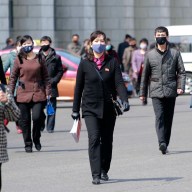By Joanna Zuckerman Bernstein
BUENOS AIRES (Reuters) – Argentina’s economy eeked out 0.5 percent growth in the first quarter compared with the year-earlier period, the government said on Wednesday, releasing its first 2016 growth data under President Mauricio Macri. The number, published by the freshly revamped Indec statistics agency, surpassed analysts’ expectations of a 1.3 percent contraction for the January through March period, according to a Reuters poll. Indec revised its 2015 growth figure to 2.37 percent from the 2.1 percent expansion that Macri’s government had initially reported for last year.
The slight rise in first quarter in gross domestic product was also helped by a 7.5 percent expansion in Argentina’s fishing sector and growth of 4.2 percent in transport.
Construction and agriculture, crucial because the country is a grains-exporting powerhouse, both fell by more than 5 percent, Indec said.
Since Macri took office in December, he has tried to boost Latin America’s No. 3 economy with free-market measures. He eliminated currency controls and grains export taxes, lowered utility subsidies, and settled a long-standing lawsuit with bond-holders that had kept the country in default. Argentina’s finance minister Alfonso Prat-Gay said last week the economy needs investment and is at risk of declining due to a recession in Brazil.
Statistics agency Indec had long been accused of reporting inaccurate economic data under former President Cristina Fernandez.
Macri’s team overhauled the Indec to come up with accurate figures and reestablish confidence in its data.
Andres Borenstein, BTG Pactual’s chief economist for Argentina, said he did not question the credibility of the figures released Wednesday.
“I don’t have any reason to suspect any problem with this set of data,” he said.
(Reporting by Joanna Zuckerman Bernstein; Additional reporting by Walter Bianchi; Editing by Chizu Nomiyama and Diane Craft)
Argentina says economy grew 0.5 percent in first quarter under President Macri

By Joanna Zuckerman Bernstein











